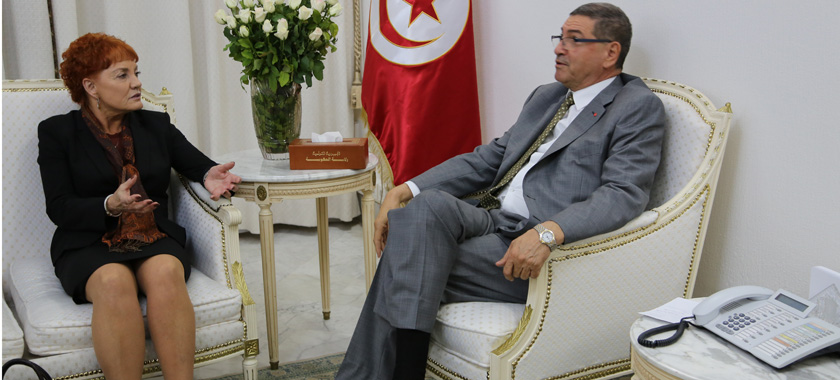
Marit Nybakk, First Vice President of the Storting, in talks with Tunisia’s Prime Minister, Habib Essid. Photo: The Storting.
Nobel Peace Prize important for Tunisia's reputation
Closer ties between the Storting and the Tunisian Parliament, and the fragile state of democratic development in the country were on the agenda during Marit Nybakk’s official visit to Tunisia from 2nd to 5th November.
“The Nobel Peace Prize ceremony in Oslo will be an important opportunity to further Tunisia’s international reputation after what has been a demanding year,” Ms Nybakk, First Vice President of the Storting, said during her visit to Tunis.
Closer ties between the Storting and the Tunisian Parliament, and the fragile state of democratic development in the country were on the agenda during Marit Nybakk’s talks with President of the Parliament Mohammed Ennaceur and Prime Minister Habib Essid in Tunis on 3rd November. The intention behind the long-planned visit was to strengthen relations with the Tunisian Parliament and to pave the way for an exchange of views on the country’s reform process.
“The Storting is keen to continue exchanging views and experiences with the Tunisian Parliament about the extensive reform process facing the country,” Ms Nybakk underlined.
Nybakk invited President of the Parliament Ennaceur to Oslo as part of the continued dialogue between the Storting and the Tunisian national assembly. Mr Ennaceur pointed out that Tunisia is eager to learn from such good international examples as Norway.
Improved security situation
Tunisia’s new constitution bears witness to the excellent results that have come out of the recent years’ reform process,” Ms Nybakk said in her meeting with Prime Minister Habib Essid.
Mr Essid pointed out that Tunisia has made good progress in the first phase of democratic change in the country. That being said, attempts to achieve social, economic and security stability will be part of a longer process. The forthcoming five years’ comprehensive reform programme aims to provide the conditions for increased investments in the country.
When asked about the security situation in Tunisia, Mr Essid replied that the border with Libya was now under relatively good control after a challenging and difficult period.
Norwegian experience important for human rights efforts in Tunisia
Another key element of Ms Nybakk’s programme concened the establishment of a national institution for human rights connected to the Tunisian Parliament. Ms Nybakk was joined by Anne Lindboe, the Norwegian Children’s Ombudsman, for a public hearing on children’s rights within a new and independent Tunisian human rights institution.
In her opening remarks, Ms Nybakk stressed how much Norway had learned from the women’s liberation struggle. She emphasized that Norway had elected to tackle many of the challenges now facing Tunisia through its system of ombudsmen.
Last updated: 06.11.2015 13:12